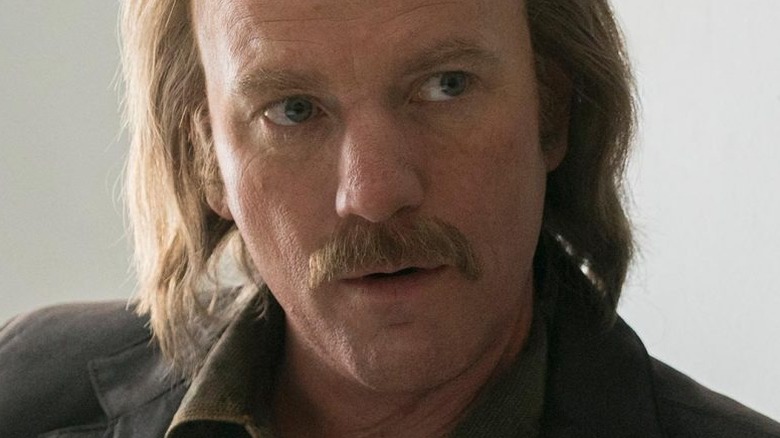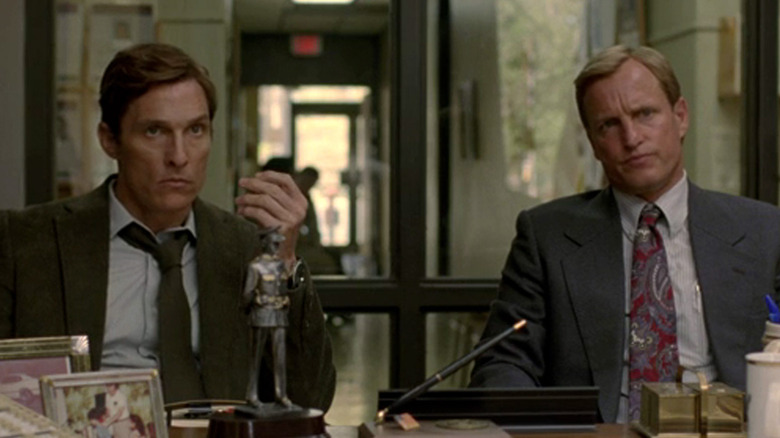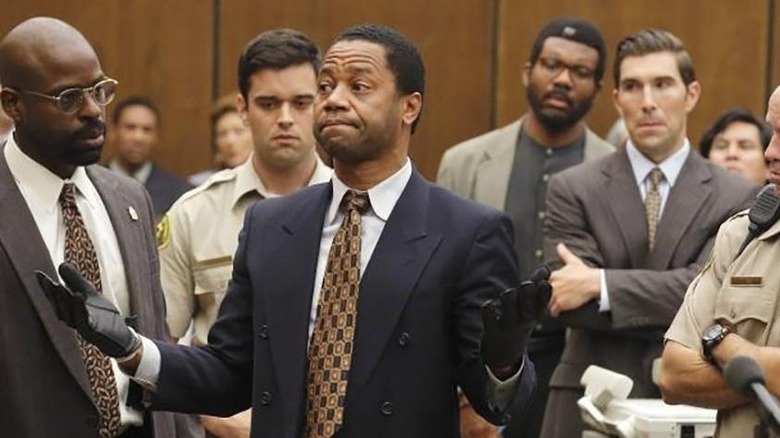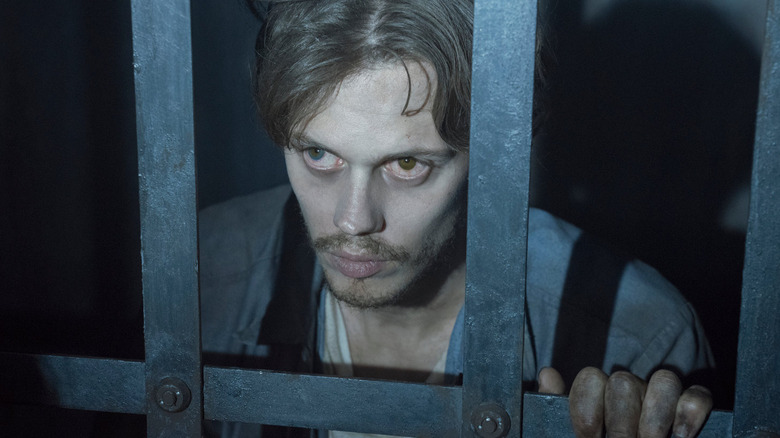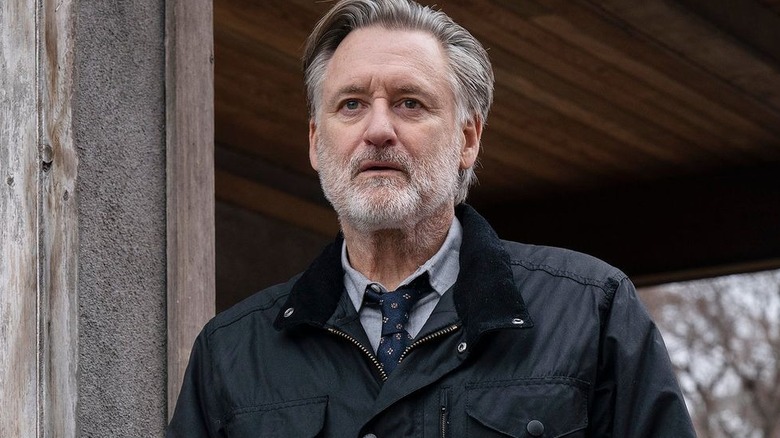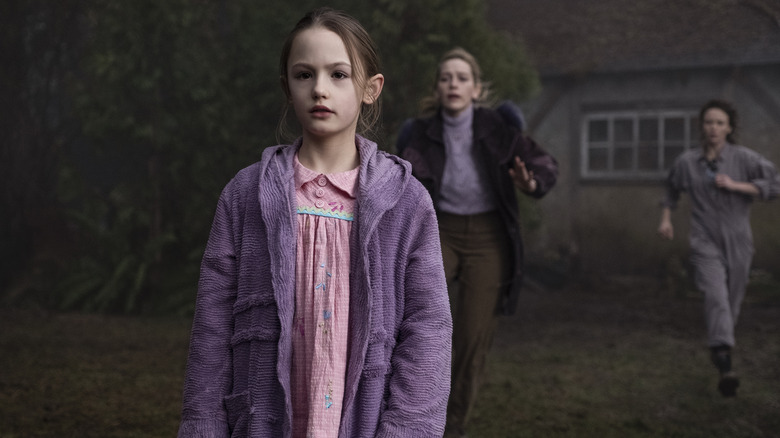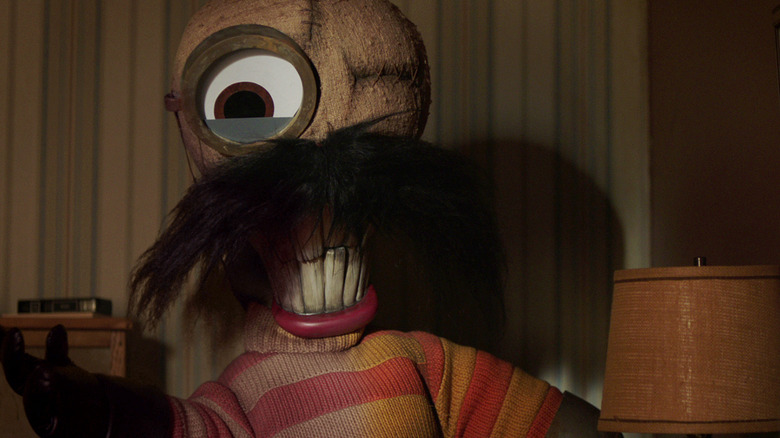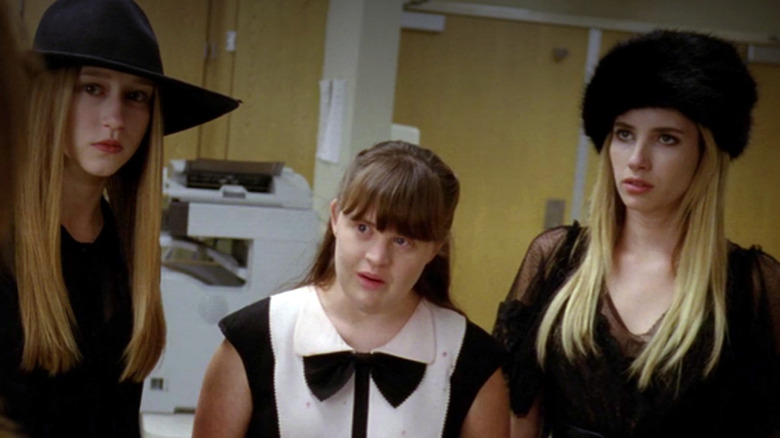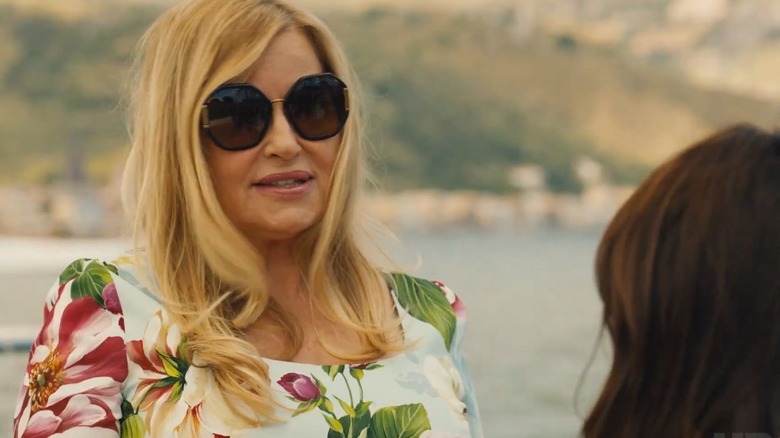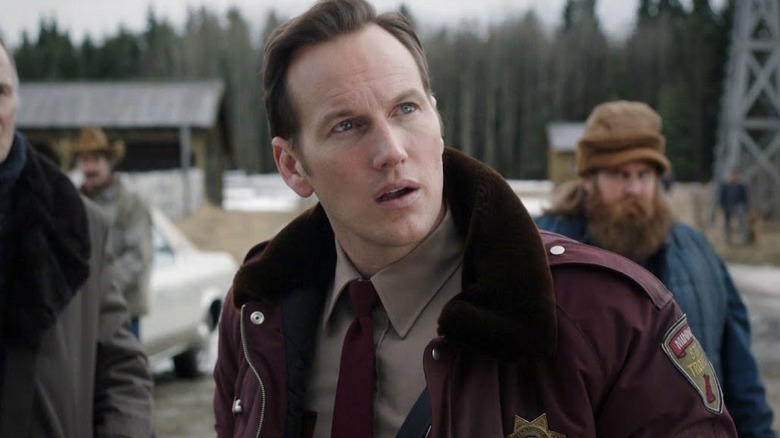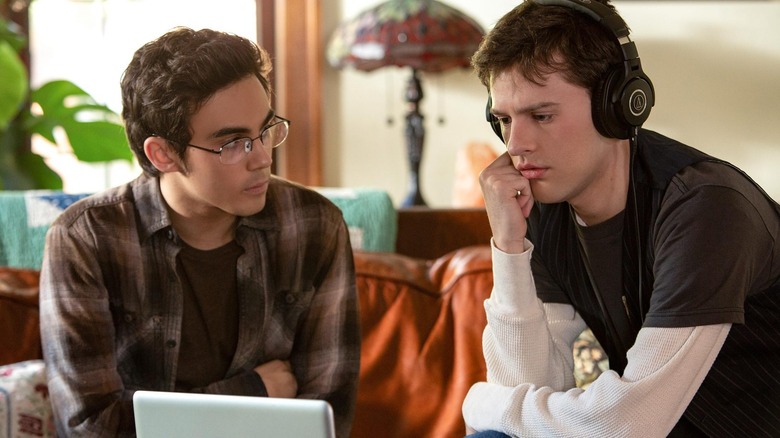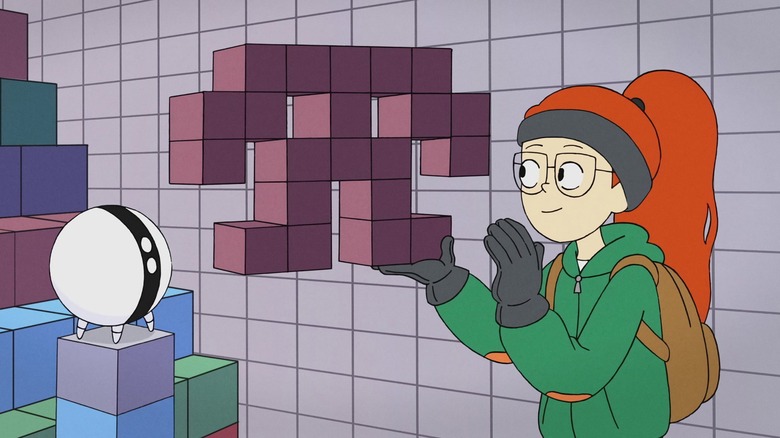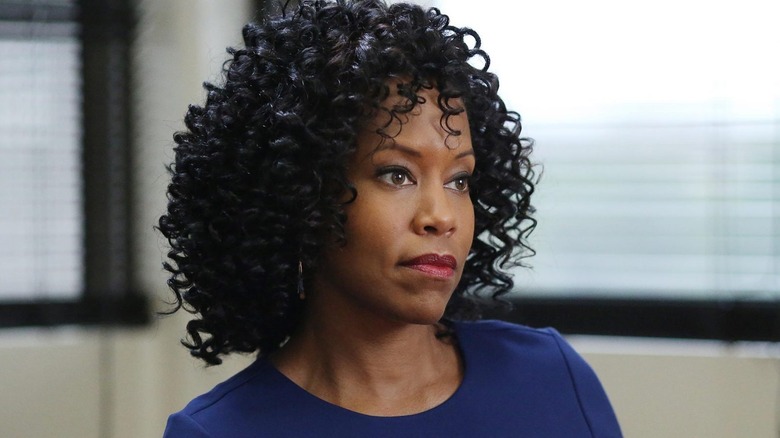12 Best Season-By-Season Anthology Shows Of All Time
What typically defines an anthology show is that there isn't one single continuous story and group of characters throughout the entire run of the series. Every show handles things a little bit differently, but most commonly there is a point when an existing story completely wraps up, and most — if not all — of those characters exit, making room for a whole new plot, group of characters, and or setting entirely. Most anthology shows do this every episode, including "Black Mirror," "The Twilight Zone," and "What if...?" But there are some shows that stick with one thing for an entire season before hitting the reset for the next one.
The most prominent and longest-running (as of 2023) example of a season-by-season anthology show is "American Horror Story," and its success has definitely led to other shows following that format. It's a conceit that seems to lend itself well to the horror genre, as that is one of the most common types of anthology show in terms of both season-by-season and episode-by-episode angles. But it's a setup that has been played with in other ways as well, including mockumentary anthology shows and stories that are based on real events.
For those that are fans of this type of show, here are the best ones of all time — only including series that have had at least two seasons and excluding those that were planned to be anthology shows but never got another season (or the second season is still forthcoming).
True Detective
In 2014, when the first season of "True Detective" aired on HBO, it was still something of a novelty when established movie stars took on lead roles in a TV series. So it was with a fair amount of buzz that the show had Matthew McConaughey, Woody Harrelson, and Michelle Monaghan as the three main leads. But while they surely helped to bring an audience, the first season of "True Detective" definitely would've still stood just fine on its own with its sharp writing, extremely well-developed characters, and twisting non-linear structure that led to a sucker punch of a finale.
Seasons 2 and 3 didn't quite reach the quality of the first, but each has still been an enthralling police procedural that borrowed the first season's crisscrossing narrative conceit, gritty tone, and tendency to cast Hollywood A-listers — including Mahershala Ali, Colin Farrell, Rachel McAdams, and Vince Vaughan. Each episode has not only the production values but also the artistic heft of a feature film, and it'll be exciting to see what characters are introduced and what the location will be for the upcoming Season 4.
American Crime Story
The screenwriting team of Scott Alexander and Larry Karaszewski made a name for themselves making biopics about subversive or otherwise unlikely subjects, including comedian Andy Kaufman, filmmaker Ed Wood, publisher Larry Flynt, and actor Rudy Ray Moore. After mostly working in film, they decidedly to use those talents on the small screen when they teamed with producers Ryan Murphy and Brad Fulchuk to make a series based on the media circus murder trial of O.J. Simpson — and thus, the first season of "American Crime Story."
The second season tackled serial killer Andrew Cunanan, focusing specifically on the murder of famed fashioned designer, Gianni Versace. In 2021, the series covered Bill Clinton's affair with Monica Lewinsky and subsequent impeachment, told primarily from Lewinsky's point of view and with her serving as producer (per IMDb). While each season has seen slightly diminishing returns and has yet to be as excellent as that first season — and its career-revitalizing performances by Cuba Gooding Jr., John Travolta, and David Schwimmer – each of the three seasons has still been an extremely compelling watch. Season 4, with a spotlight on the infamous Studio 54, is in development (per Deadline).
Castle Rock
Though horror author Stephen King has never taken things to MCU levels, reusing various fictional towns and dropping subtle references to past works suggests that many of his books take place in a shared universe. With that in mind, it's almost surprising that nobody just went all-in on a Stephen King multiverse as the premise of a TV show prior to Hulu's "Castle Rock." Named after the fictional town of Maine that King has used as the setting for many of his stories, each of the two seasons tells its own original story but draws heavily from existing King books and feature appearances by some of his characters.
In addition to being a well-made horror series on its own, "Castle Rock" is also a love letter to King's work and is tailor-made to delight his fans. In fact, the critical consensus points out that perhaps the show only really worked for longtime King readers and may have been a bit lost on newcomers or more casual admirers of his work. But there's nothing wrong with a show that is made by the fans and for the fans of a particular artist, and it isn't like King is an especially niche element to build a series around. Unfortunately, despite strong praise — with the second season rated even higher than the first — Hulu axed any plans for a third season and beyond (via Deadline).
The Sinner
USA Network's "The Sinner" is somewhat unique among anthology shows in that it has a consistent protagonist across all four of its seasons — and that protagonist's journey ends up being a big part of the show's appeal. But each season sees that character, Detective Harry Ambrose (an excellent Bill Pullman), tackling a completely different crime whose investigation begins and ends within that season and with an entirely new cast of characters beyond Harry and a few select people that are close to him.
The pilot episode of "The Sinner" instantly grabs viewers as we see a young woman (Jessica Biel, who also executive produced) enjoying a day at the beach when suddenly as if possessed, walks over to a seemingly random person and stabs him to death. Harry's investigation into what happened and why this woman snapped is full of psychologically complex twists and turns and an ending that is virtually impossible to see coming.
Season 2 takes Harry into an apparent cult, while Season 3 has him looking into a car accident that he quickly realizes is nothing like it initially seemed. The fourth and final season gets a little deeper into Harry's personal life, and his own inner demons end up playing more of a role in his latest investigation than he bargained for. It's a fantastic series, not to mention a wonderful late career showcase for the often underappreciated Pullman.
The Haunting
There is obviously no shortage of horror shows, anthology or otherwise, but "The Haunting" franchise stands out from the pack in its willingness to be a slow burn. One of the advantages to being a series instead of a movie is that there is more time to build the tension, not being required to get to the big scares 20-30 minutes in like most scary movies. Both installments of the two-season series – "The Haunting of Hill House" and "The Haunting of Bly Manor" – don't rush things and aren't afraid to take several episodes before showing anything truly terrifying, and that's exactly why they are both so effective.
Both seasons focus on a particular house and the haunting of said house, but they each do various things to stand apart from one another. "Hill House" follows the established tradition of a family moving into a house and discovering it is haunted, while "Bly Manor" sees a man tasked with taking over the care of his niece and nephew in their existing haunted house. Did the houses curse the occupants, or did cursed occupants infect the houses? Discovering the answer is half the fun, as things slowly descend into classic gothic ghost story territory as each season goes on. In October 2022, series creator Mike Flanagan told TV Line there aren't currently any plans for more seasons of "The Haunting," but didn't completely shut the door on the possibility either.
Channel Zero
Creepypastas — initially a word for internet-based urban legends but now expanded to encompass internet-derived scary stories as a whole — have been one of the biggest movements in horror over the last decade or so. Slender Man might be the most well-known creepypasta creation on a mainstream level — especially after it earned widespread notoriety for the real-life crime it inspired and the subsequent movie adapted from it — but those in the know can name dozens of other characters and stories.
Having a horror anthology show that adapts creepypastas might be a great idea on paper, but anyone who has seen the "Slender Man" movie knows just how badly things can go when such a thing is attempted. But Syfy's "Channel Zero" didn't take the more obvious route of having each individual episode be a different creepypasta story and instead devoted entire seasons to them, giving each one adequate room to fully develop and tell the stories. The four seasons of "Channel Zero" have been based on the stories "Candle Cove," "No-End House," "Search and Rescue Woods" (adapted as "Butcher's Block"), and "The Hidden Door" (adapted as "The Dream Door").
The critical consensus of the show was "creepy, unsettling, and refreshingly unique" and its effectiveness at turning common fears we all had as children into top-notch horror television was praised. While Syfy canceled it (via Deadline), here's hoping someone else copies this angle and brings more creepypastas to the small screen.
American Horror Story
Not only did "American Horror Story" help to ignite the current anthology show boom, but it remains one of the key players in the genre. Though the various connective threads have become more apparent as the seasons have gone on and some have essentially been direct follow-ups of others, the show still largely follows its anthology format in that every season tells a complete story with a beginning, middle, and end as well as — with a few notable exceptions — an entirely new cast of characters each time out.
The vibe, tone, and story of each season of "AHS" has varied wildly, from the dark gothic horror of "Hotel" to the retro slasher flick conceit of "1984." What they all have in common — apart from frequently returning actors like Sarah Paulson, Evan Peters, Emma Roberts, and Lily Rabe — is that they tell mostly fictional stories but base them all on various real-life events, sometimes even having actors portray actual serial killers or other real people.
With 11 seasons so far, not every one has been a home run, but none have been completely unwatchable and all of them reward viewers who see things through to the finale. A spin-off, "American Horror Stories," launched in 2021 and features a different story per episode rather than per season, with several episodes serving as continuations of or prequels to existing "American Horror Story" seasons.
The White Lotus
Even though it has only been around since 2021 and is only two seasons in, "The White Lotus" has already raised the bar for anthology shows and television dramedies in general. Created by filmmaker Mike White ("School of Rock," "Enlightened") — who also writes and directs every single episode (via IMDb) – the primary connective fabric of the show is that each season takes place in one of the worldwide locations of the titular upscale resort chain. Without giving too much away, there are also two characters who made the jump from Season 1 to 2, but each has an entirely new cast otherwise.
While trailers for "The White Lotus" may suggest some sort of dark or even mystical force at work, what actually ends up unfolding on the show is simply a series of very unfortunate events, often set into motion by the victims of the events in a very self-fulfilling prophecy type of way. The show could've easily devolved into the cliched territory of watching rich people be terrible to one another and themselves that we've seen a million times, but the writing and performances elevate things beyond those tropes and things never quite go the way you are absolutely positive they are going to. Yes, these characters live very charmed lives — but they are also all deeply dysfunctional in a variety of ways, and it's impossible to look away as those dysfunctions tear them apart.
Fargo
The "Fargo" TV series is as closely related to the movie of the same name as it is based on a true story – as it jokingly claims at the beginning of each episode — but the DNA of the Coen brothers' acclaimed dark comedy definitely makes itself known, particularly in the first two seasons. Like the movie, the TV series often largely takes place outside of its titular town but still ends up including it in some important way during the course of the season.
The first three seasons of "Fargo" all center around one or more murders and the local law enforcement tasked with solving them, with the officers typically replicating the movie version's Marge Gunderson hiding shockingly tight investigative skills behind a misleading veneer of aloofness. Along the way, the officers meet a cast of outrageous characters, equal parts hilarious and deeply unsettling. Things typically end up building to a ridiculously and intentionally over-the-top climax that includes things like UFOs and raining frogs, not unlike a Coen brothers movie.
The fourth season proved a bit divisive by playing with the format and being a racially-charged story about a Black crime syndicate going to war with the Italian mafia in the 1950s, but those that stuck with it saw plenty to love about it and appreciate the show's willingness to go different and go big. Season 5 promises to be more comedic in tone and also much closer to the present day than any previous season.
American Vandal
While the brilliant "Documentary Now!" had already done the mockumentary anthology show schtick, that series does a different thing for each episode. In the case of the criminally short-lived "American Vanda," the format is stretched out season-wide. While being tackled by the same two fictional budding documentary filmmaker high schoolers, the two seasons are each about solving a different mystery at a different school and feature an almost entirely different group of classmates, faculty, and other assorted teens and adults.
The first season of "American Vandal" has Hanover High School students Peter Maldonado (Tyler Alvarez) and Griffin Gluck (Sam Ecklund) trying to solve the mystery of who vandalized all of the cars in the school's parking lot with spray-painted images of a certain male body part. Season 2 sees Peter and Griffin reteam to get to the bottom of an incident at another school in which dozens of students and staff members simultaneously get violently sick one day.
The genius of "American Vandal" is the way that the boys tackle the mysteries with complete and utter seriousness, as do the people they are interviewing, with the laughs coming by way of the deadpan manner in which all of these people are asking and answering questions about the sorts of things that are typically designed to make children giggle. After two acclaimed seasons, Netflix canceled "American Vandal" despite a third season having already been mapped out.
Infinity Train
Not all anthology shows are live-action, nor does every anthology show have to be for adults. In fact, one of the best is the highly underrated "Infinity Train," an animated series that began airing on Cartoon Network in 2019 for two seasons before making the jump to HBO Max for its final two seasons. While the premise of a massive, ever-moving train traveling through a seemingly empty world might sound familiar, "Infinity Train" actually leaves the "Snowpiercer" series in its frosty dust.
"Infinity Train" is a fantastical adventure about the passengers that have boarded the mysterious and magical train to deal with the emotional and psychological baggage they have brought with them. Season 1 focuses on a girl named Tulip (Ashley Johnson) who is dealing with the recent divorce of her parents. In Season 2, the protagonists are MT (the mirror world version of Tulip, also voiced by Johnson) and a boy named Jesse (Robbie Daymond) who needs to learn to stand up for himself. And on it goes, with each subsequent season focusing on a new character who was a minor or side character in a previous season.
In that way, "Infinity Train" does have a lot of continuity and overlap with previous seasons and shares many of the same characters, but the way it plays with the anthology format and doesn't feel beholden to any arbitrary rules of the genre is a big part of what makes it such a special experience.
American Crime
No, this isn't "American Crime Story," and it's a mystery why anyone thought it was a good idea to launch two anthology crime shows with very similar titles just a year apart. "American Crime" debuted on ABC in 2015, with its first season focusing on a veteran who was murdered and his wife assaulted in a home invasion that went too far. Four suspects are brought in, and it quickly becomes apparent that racial biases and tensions are going to come into play.
Season 2 sees a mother try to get the authorities involved to get justice for her son after photos of him post-assault are put on social media by the alleged perpetrators. The third and unfortunately final season doesn't just focus on one clearly-defined crime and instead follows the lives of several people who face serious adversity as they try to live out the so-called American dream.
Though each season has an entirely new story and characters, it reuses several actors — including Regina King, who won two Emmy awards for it — to play different roles. All three seasons were highly acclaimed, with season 1's 94% being the lowest-rated of the three and each one doing critically better than the last. Perhaps the show could've lived on via a streaming service where immediate ratings don't make or break a show, but even so, the three seasons of "American Crime" stand as the high water mark for what an anthology show can be.
